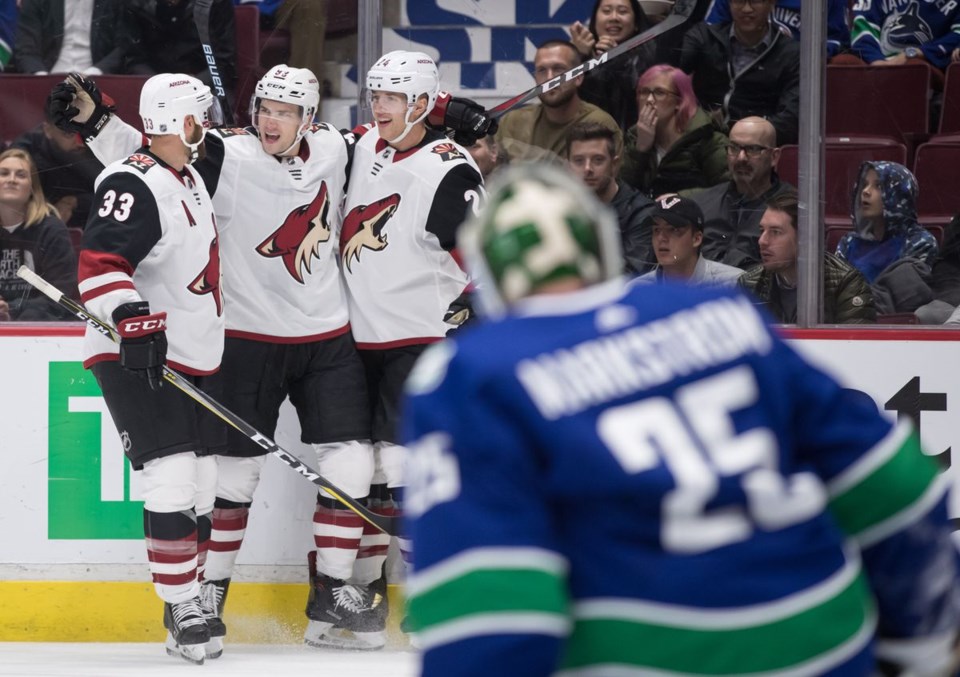Pacific Pool Party is a weekly column where Ryan Lambert breaks down the Canucks' biggest rivals in the Pacific Division.
When you make a mid-season trade for a guy who’s likely to be the biggest free agent come July 1, you are staking your claim as a legitimate contender for the top of your division.
Of course, when the Arizona Coyotes traded for Taylor Hall in mid-December, they weren’t counting on their starting goalie getting hurt within a few days and missing two months. Nor were they counting on his backup to spend the first month of that injury playing below the league average, where before he had been one of the best No. 2 goaltenders in the league.
But with seemingly no end in sight to the Darcy Kuemper injury saga — he was supposed to come back last week but had a pregame setback and is back on the shelf — the Coyotes are at a crossroads. They climbed nearly to the top of the Pacific on the strength of Kuemper having a second-straight monster season. If not for injuries and assuming he kept up his level of play, he would likely be leading the Vezina conversation, and Arizona would be a lot better than their current position: hanging tenuously onto that last Western Conference wild card spot, with more games played than anyone in the league.
This is a team that, like a lot of its rivals in the Pacific Division, started out the year looking pretty good before collapsing back to earth a bit and struggling to stay above water at 5-on-5, or in all situations. For the full season, the Coyotes are a shade under 50 percent in expected goals, but since the big trade (at which point they were already trending down), that number is close to 48 percent. Ninth-worst in the league. Not good.
Which brings the conversation back to Hall. He was brought in to shore up what can only be described as a subpar offense with almost no depth, provide support for a struggling Phil Kessel, and generally make the Coyotes more than just a one-man team. That hasn’t happened. He had struggled on a struggling New Jersey team and it was thought the change of scenery might be a positive, but it really hasn’t been.
Hall has now played 27 games for the Coyotes, just under the 30 he had with the Devils. In the first part of the season, he had 6-19-25 in all situations. Since the trade, he has 8-14-22, including an assist yesterday. The goals pace has obviously improved but overall production hasn’t, and that’s actually more to do with luck than anything; he’s underperforming individual expected goals by very slightly with Arizona, and with New Jersey he was under by 5.06 goals. Overall, he has one more primary point in Arizona than he did with the Devils.
That’s obviously not to say he hasn’t provided benefits or anything, because Hall has done a good job drawing penalties and has been a positive play driver. And it’s also not his fault Kuemper got hurt, which has been the center of the team’s struggles for these past two months. But the team is really having difficulties staying in the divisional playoff race, to the point that some wondered whether the team would trade Hall again to a legit contender.
By all indications, there’s no intention of doing that, both because Kuemper is near returning and could help the team play at a more respectable points pace once again, and because the team wants to pitch Hall (29, coming off two straight bad seasons, and all but guaranteed to test the market on July 1) on sticking around long-term.
Both could be fool’s errands. Probably are. But if that’s the reality we’re working with, then that’s the reality we’re working with. The question, then, is what GM John Chayka intends to do as the deadline approaches. As we saw on Sunday, it seems like it’s officially shopping season, as Hall’s former employer made two more notable trades and probably has some additional lines in the water.
The Coyotes cannot, as things currently stand, or even with Kuemper back healthy and at 100 percent, look at this roster and think it’s ready to truly compete. Right now it looks like only two of the Jets, Predators, Flames, and Coyotes will make the playoffs and on paper, Arizona might have the worst roster of the bunch. Frankly, you could probably include everyone in the top five in the Pacific in their own little bracket, but you have to come away with the same conclusion: this Coyotes group isn’t good enough to stand up long-term without Kuemper absolutely going off.
So what does Chayka do? Can he really add to this group knowing all it would likely get him is a first-round playoff exit? Especially after the Hall trade (which included a top prospect and sends one of Arizona’s next two first-round picks to New Jersey), he might not really have the chips to make a deal. Especially because, incredibly, the team is basically capped out even with Marian Hossa already on LTIR.
If he’s smart — and he must be; he recommends a book called “AlphaBrain” — he stands pat. The team made its big splashy trade for a name talent already. Just let the chips fall where they may and hope like hell Kuemper is good to go in the next few days.
Expending more assets to prop up this group would be inadvisable.
Ryan Lambert is on Twitter @twolinepass.




